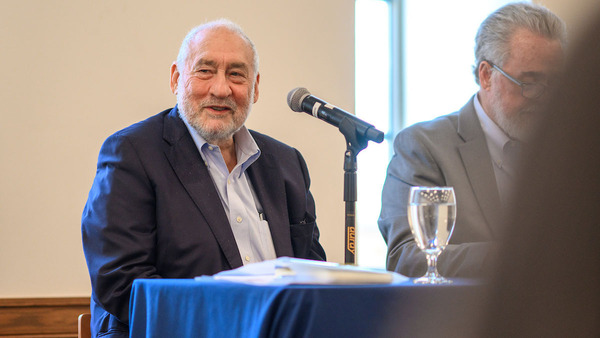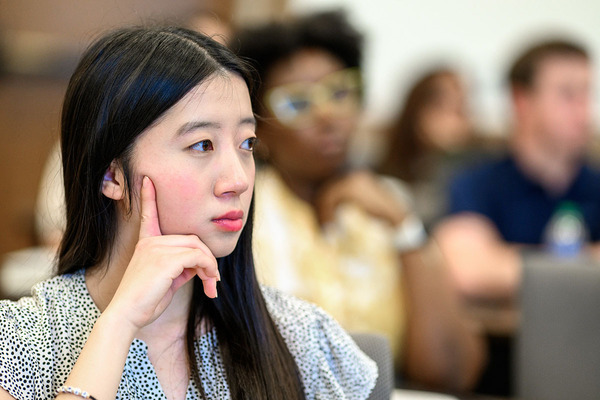Nobel laureate Joseph Stiglitz addresses inequality with a people-centered economy

Inequality is a policy choice — not an inevitable outcome — and can be addressed through economic approaches that prioritize human dignity, economist and Nobel laureate Joseph E. Stiglitz said during a recent visit to the University of Notre Dame’s Keough School of Global Affairs.
Stiglitz, a Columbia University professor and former chief economist at the World Bank, met with faculty and students as well as Keough School and Notre Dame leadership during his April 15 visit to campus, during which he delivered the inaugural Joseph E. Stiglitz Lecture on Inequality and the Good Society.
The new lecture series, made possible with support from the Ford Foundation, was organized by Ray Offenheiser, director of the Keough School’s McKenna Center for Human Development and Global Business. The series is dedicated to bringing outstanding scholars to Notre Dame to share groundbreaking scholarship and policy insights on inequality and is a part of larger strategic efforts by the school and the University to address global poverty.
Watch a discussion between Joseph Stiglitz and Ray Offenheiser on global inequality here.
Rules create structural inequality
During his public remarks, Stiglitz outlined the ways inequality is written into the rules of the U.S. and global economies by powerful interests that prioritize profit.
“Markets don’t exist in a vacuum,” Stiglitz said. “We structure our market with rules and regulations. Rules matter for creating inequality. [In the United States], we’ve frankly made a choice to have more inequality than other countries.”
In the United States, some 40 years of neoliberal — or free-market-oriented — economic policies have bolstered corporations and lowered the living standards of everyday people, Stiglitz said. In particular, rules have weakened antitrust protections and permitted monopolies; weakened worker bargaining power, ensuring that wages haven’t kept pace with profits; crafted bankruptcy laws that favor companies while forcing bankrupt consumers to repay student loans; and allowed corporations to pay low taxes while enjoying massive profits.

As a result, Stliglitz said, the United States has less economic mobility than peer countries — meaning that for U.S. residents, life outcomes are more dependent on their parents’ income and education levels than they are for people in other wealthy countries.
These regressive policy choices are reinforced by the United States’ political system, Stiglitz said, where Supreme Court decisions like Citizens United have given corporations more power to make political donations and shape the rules in their favor. And inequality remains a problem globally as well, he said: Multinational corporations lobby to keep their tax rates low, and the international debt architecture favors wealthy creditors over cash-strapped countries that slash public spending in order to afford high debt payments.
Ultimately, the inequality created by these systems and structures threatens the future of democracy, Stiglitz said, adding that widespread dissatisfaction leaves voters vulnerable to demagogues who mislead the public and discard democratic norms.
Prioritizing human dignity: Policy and practice
While Stiglitz was unsparing in his critique of the status quo, he also expressed optimism that voters and policymakers could make different choices and reframe how they think about and discuss the concept of freedom. He urged audience members to think of freedom not as fewer government regulations but rather as the opportunity for everyday people to live a good life.
“Freedom should be about human dignity and human flourishing,” Stiglitz said.
Such an approach — one that prioritizes the needs of marginalized people and communities — made Stiglitz a natural fit to inaugurate the Keough School’s new inequality lecture series, said Scott Appleby, the Marilyn Keough Dean of the Keough School.
“Confronting inequality can make us uncomfortable because it may challenge us personally to face some hard facts about our economic system and who it benefits at the expense of others,” Appleby said.
“But such moral and intellectual discomfort may be just the challenge we all need. Indeed, commitment to human dignity and intellectual development challenges us to examine those social structures and systems that explain and sustain the marginalization of the poor, and to pursue policies and practices that would create a more equitable and just world.”
Watch the full lecture here.
Originally published by Josh Stowe at keough.nd.edu on April 22.
Contact: Tracy DeStazio, associate director of media relations, 574-631-9958 or tdestazi@nd.edu
Latest International
- Notre Dame Rome signs agreement with Rome’s Sovrintendenza Capitolina ai Beni CulturaliIn September, Notre Dame Rome, part of the University of Notre Dame’s global network, signed a three-year agreement with Rome’s Superintendence of Cultural Heritage, which will allow Notre Dame faculty, undergraduate students and graduate students privileged study and research access to some of the city’s most significant historic buildings and cultural artifacts.
- ND Expert: Han Kang, first Korean writer to win Nobel Prize in literature, ‘has irrevocably changed the landscape’On Oct. 10, the Nobel Prize in literature was awarded to Han Kang, the first Asian woman writer and the first Korean writer to win the prize. According to Hayun Cho, an assistant professor of Korean literature and popular culture at the University of Notre Dame, Han’s win is moving for many, including for readers of the Korean diaspora.
- Former Irish prime minister to speak at Notre DameLeo Varadkar, former prime minister of Ireland and current member of parliament in Dáil Eireann, will join the Keough-Naughton Institute for Irish Studies, part of Notre Dame's Keough School of Global Affairs, for a public discussion of Irish current affairs including public health initiatives, civic life and the political future of the island of Ireland. “A Conversation with Deputy Leo Varadkar” will take place from 3 to 4:30 p.m. on Sept. 20 (Friday) in the Hesburgh Center Auditorium. The event is free and open to the public.
- Using forest resources strengthens food security, study findsForests can reduce hunger in rural households while also capturing carbon and advancing sustainability goals for low- and middle-income countries, according to new research by Daniel C. Miller, associate professor of environmental policy at Notre Dame’s Keough School of Global Affairs.
- Notre Dame Global names Eimear Clowry Delaney as director of Notre Dame DublinEimear Clowry Delaney has been appointed the Michael J. Smurfit Director of Notre Dame Dublin and officially assumed the role on July 1. Kevin Whelan, who has served as the inaugural director since 1998, will now shift his focus to teaching and research.
- COVID-19 pandemic tied to low birth weight for infants in India, study showsThe incidence of low birth weight rose sharply in India amid the COVID-19 pandemic, according to new research from Santosh Kumar, associate professor of development and global health economics at Notre Dame’s Keough School of Global Affairs.













